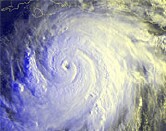
THURSDAY, July 3, 2014 (HealthDay News) — As Hurricane Arthur threatens the East Coast of the United States, people are getting an important reminder about safety preparations they need to make for hurricane season.
Power outages and flooding are common when a hurricane strikes and could put your food supplies and drinking water at risk, according to the U.S. Food and Drug Administration.
That’s why the agency recommends keeping emergency supplies of food and water stored in your home. The recommended amount of water is one gallon per person per day, or 12 gallons for a family of four. This should last for three days. You should use store-bought bottled water and keep it in a dry, dark place.
Your emergency food supplies should take into account the dietary needs of your family. You should routinely check the expiration dates of these foods and replace them if necessary.
It’s also important to make sure you have a sufficient supply of prescription medications for any family members who require them because after a serious storm, it may be some time before pharmacies can open again, the FDA said.
If you have pets, be sure to have an emergency supply of food, water and medicine for them.
If the power goes out, keep your refrigerator and freezer doors closed. Food in an unopened fridge is safe to eat if the power is out for less than four hours. Food in a freezer is safe for 48 hours if the freezer is full or 24 hours if it is half full.
If the power is still out after four hours, transfer food in the fridge to a cooler with ice or frozen gel packs. Throw out any perishable food that has been above 40 degrees Fahrenheit for two or more hours, the FDA said.
If there has been flooding, do not eat any food that is not in a waterproof container if there is any chance that it came into contact with floodwater. Inspect canned foods and throw away all cans that show signs of damage, including swelling, leaks, punctures, holes or rust.
If possible, give infants only ready-to-eat formula. If only concentrated or powdered formula is available, prepare the formula with bottled water or water that has been sterilized. Ensure that the bottles and nipples are clean.
For drinking water, use bottled water that has not been exposed to floodwaters. If bottled water is not available, boil water for one minute. Let the boiled water cool and store it in clean containers with covers, the FDA said.
If you can’t boil water, use household bleach. Add 1/8 teaspoon (8 drops) of regular, unscented liquid household bleach per gallon of water. Stir well and let it stand for at least 30 minutes before you use it.
If the water is cloudy, filter it through a clean cloth or allow it to settle and draw off the clear water for disinfection.
If your well has been flooded, have it tested and disinfected after the floodwaters recede, the FDA said.
More information
The U.S. National Library of Medicine has more about hurricanes.
Copyright © 2026 HealthDay. All rights reserved.

